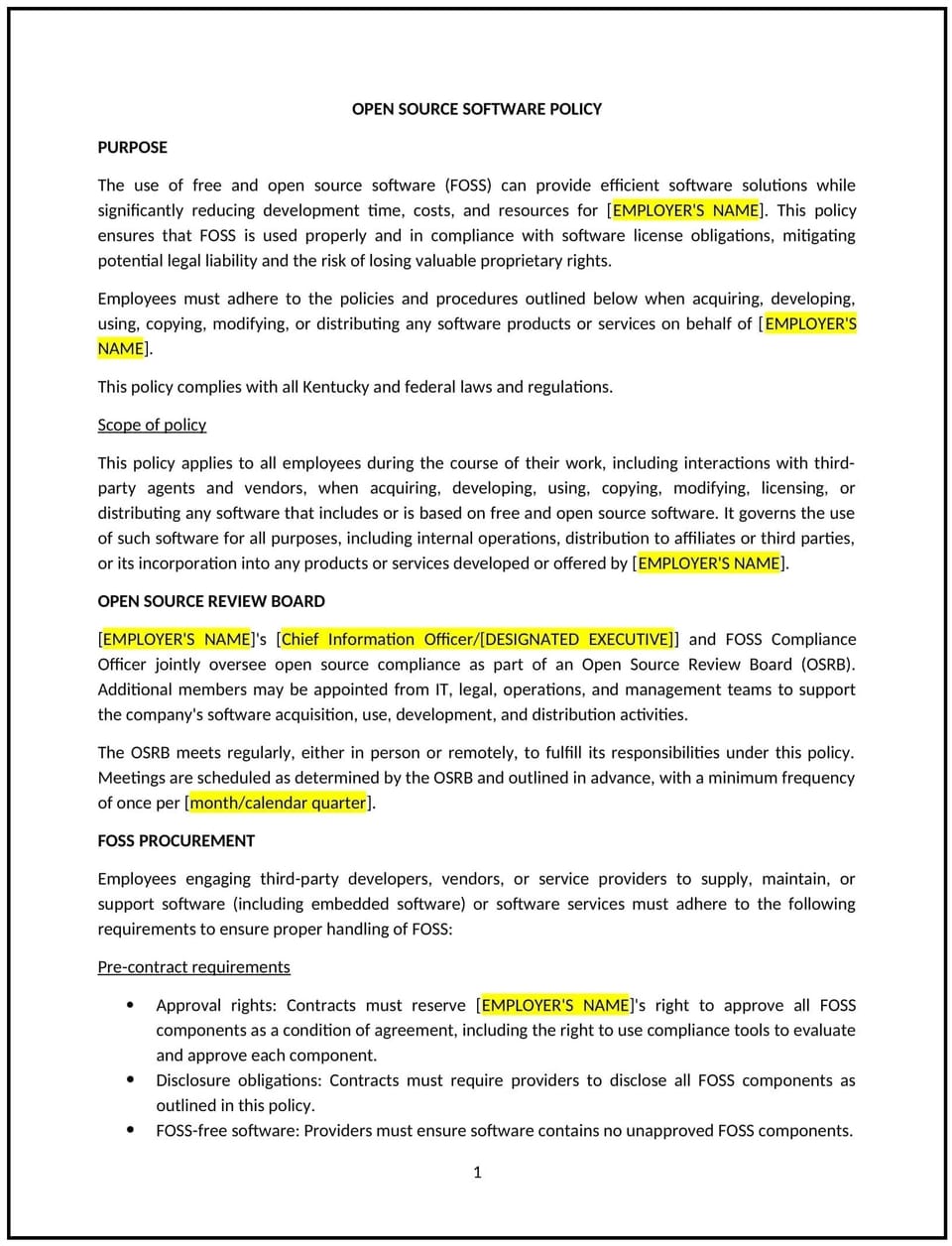Open source software policy (Kentucky): Free template

Open source software policy (Kentucky)
An open source software (OSS) policy provides Kentucky businesses with guidelines for using, contributing to, and managing open source software within their operations. This policy ensures that OSS is utilized responsibly, complies with licensing requirements, and aligns with business objectives.
By adopting this policy, businesses can leverage the benefits of OSS while mitigating risks related to compliance, security, and intellectual property.
How to use this open source software policy (Kentucky)
- Define acceptable use: Clearly specify how employees may use open source software in business projects, including approved applications and tools.
- Address licensing compliance: Outline the process for ensuring that OSS usage complies with licensing terms, such as GPL, MIT, or Apache licenses.
- Set contribution guidelines: Provide rules for employees contributing to open source projects, including approvals required for using company time or resources.
- Establish approval processes: Require employees to seek approval before integrating OSS into business systems or applications to ensure compatibility and security.
- Implement security protocols: Specify procedures for evaluating OSS for security vulnerabilities and maintaining updates to prevent risks.
- Manage intellectual property risks: Define how the business will protect its proprietary code and avoid unintended exposure or conflicts with OSS licensing.
- Include training and resources: Provide employees with training on OSS best practices, licensing compliance, and risk management.
Benefits of using this open source software policy (Kentucky)
This policy provides several key benefits for Kentucky businesses:
- Encourages innovation: Enables businesses to leverage OSS for cost-effective solutions and faster development cycles.
- Reduces compliance risks: Helps ensure that OSS usage aligns with licensing terms and avoids legal disputes.
- Enhances security: Establishes processes for identifying and addressing potential vulnerabilities in OSS.
- Protects intellectual property: Minimizes the risk of proprietary code conflicts with open source licensing requirements.
- Fosters collaboration: Supports responsible contributions to open source projects, enhancing the business’s reputation in the developer community.
Tips for using this open source software policy (Kentucky)
- Communicate the policy: Ensure employees understand the policy through training and documentation, especially those involved in software development.
- Evaluate OSS thoroughly: Businesses should conduct risk assessments before integrating OSS into projects, checking for licensing and security concerns.
- Monitor compliance: Regularly review OSS usage and contributions to ensure adherence to the policy and licensing terms.
- Stay informed: Keep up with changes in OSS licenses, security practices, and industry standards to maintain an up-to-date policy.
- Review periodically: Update the policy as needed to reflect changes in technology, Kentucky regulations, or business operations.
Q: What is the purpose of an open source software policy?
A: The policy provides guidelines for using and managing open source software, ensuring compliance with licensing terms, security protocols, and business objectives.
Q: How can businesses ensure compliance with OSS licenses?
A: Businesses should evaluate OSS licenses before use, maintain documentation of usage, and ensure that any modifications or distributions align with licensing terms.
Q: Can employees contribute to open source projects during work hours?
A: Contributions may be allowed if they align with the business’s goals and have prior approval, ensuring that company resources are used appropriately.
Q: What steps should businesses take to evaluate OSS for security risks?
A: Businesses should conduct thorough security assessments, check for known vulnerabilities, and ensure that updates are applied regularly to mitigate risks.
Q: How does the policy protect proprietary code?
A: The policy sets guidelines to prevent proprietary code from being inadvertently shared or exposed through contributions to open source projects.
Q: Are there restrictions on using OSS in proprietary software?
A: The policy may include restrictions based on licensing terms, such as ensuring compatibility with proprietary software and avoiding license conflicts.
Q: What happens if employees violate the OSS policy?
A: Violations may result in disciplinary actions, such as revoking access to development tools, additional training, or more severe consequences depending on the impact.
Q: How often should the OSS policy be reviewed?
A: The policy should be reviewed periodically to ensure alignment with legal requirements, technological changes, and industry best practices.
This article contains general legal information and does not contain legal advice. Cobrief is not a law firm or a substitute for an attorney or law firm. The law is complex and changes often. For legal advice, please ask a lawyer.


